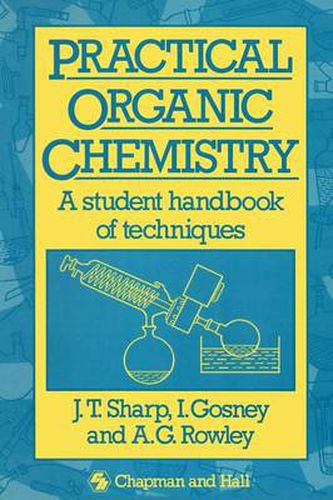Readings Newsletter
Become a Readings Member to make your shopping experience even easier.
Sign in or sign up for free!
You’re not far away from qualifying for FREE standard shipping within Australia
You’ve qualified for FREE standard shipping within Australia
The cart is loading…






This title is printed to order. This book may have been self-published. If so, we cannot guarantee the quality of the content. In the main most books will have gone through the editing process however some may not. We therefore suggest that you be aware of this before ordering this book. If in doubt check either the author or publisher’s details as we are unable to accept any returns unless they are faulty. Please contact us if you have any questions.
This book explains simply and concisely how to carry out the basic experimental procedures in the organic chemistry laboratory. It is a handbook of techniques to help students at all levels acquire the necessary skills to enable them to cope confidently with the demands of experimental work in a typical undergraduate course and, later on, in research. The emphasis is on general techniques, rather than on specific experiments in which they may be applied, because most course tutors prefer to make their own selection of tried and tested experiments. The chapters of this book are structured so that the early parts of each section concentrate on learning how to handle the equipment and on the basic principles of the technique, while the later parts are concerned with more advanced aspects, such as the optimisation of operating conditions. The section on carrying out reactions includes the techniques used for working with air and water sensitive reagents, without which much of modern organic chemistry would not be possible, and also provides concise descriptions of the methods used in hydrogenation, photochemistry and flash-vacuum pyrolysis. The sections on work-up and purification include the traditional methods of crystallization and distillation on large and small scale, and there is strong emphasis on chromatography, both the modern preparative scale methods and the analytical methods (TLC, GLC and HPLC), which are so vital in the monitoring and analysis of reactions. Safety aspects are emphasised throughout. This book should be of interest to undergraduate and postgraduate chemists.
$9.00 standard shipping within Australia
FREE standard shipping within Australia for orders over $100.00
Express & International shipping calculated at checkout
This title is printed to order. This book may have been self-published. If so, we cannot guarantee the quality of the content. In the main most books will have gone through the editing process however some may not. We therefore suggest that you be aware of this before ordering this book. If in doubt check either the author or publisher’s details as we are unable to accept any returns unless they are faulty. Please contact us if you have any questions.
This book explains simply and concisely how to carry out the basic experimental procedures in the organic chemistry laboratory. It is a handbook of techniques to help students at all levels acquire the necessary skills to enable them to cope confidently with the demands of experimental work in a typical undergraduate course and, later on, in research. The emphasis is on general techniques, rather than on specific experiments in which they may be applied, because most course tutors prefer to make their own selection of tried and tested experiments. The chapters of this book are structured so that the early parts of each section concentrate on learning how to handle the equipment and on the basic principles of the technique, while the later parts are concerned with more advanced aspects, such as the optimisation of operating conditions. The section on carrying out reactions includes the techniques used for working with air and water sensitive reagents, without which much of modern organic chemistry would not be possible, and also provides concise descriptions of the methods used in hydrogenation, photochemistry and flash-vacuum pyrolysis. The sections on work-up and purification include the traditional methods of crystallization and distillation on large and small scale, and there is strong emphasis on chromatography, both the modern preparative scale methods and the analytical methods (TLC, GLC and HPLC), which are so vital in the monitoring and analysis of reactions. Safety aspects are emphasised throughout. This book should be of interest to undergraduate and postgraduate chemists.